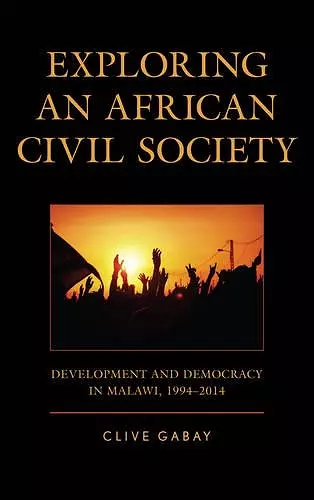Exploring an African Civil Society
Development and Democracy in Malawi, 1994–2014
Format:Hardback
Publisher:Lexington Books
Published:5th Nov '15
Currently unavailable, and unfortunately no date known when it will be back

Are civil society organizations in Africa agents of democratization, legitimators of corrupt ruling elites, agents of imperial control, or all of these things and more? Based on nearly five years of engagements with civil society organizations in Malawi, including interviews and broader ethnographic methods, this book presents a contemporary account of civil society activism in a country which provides some intriguing contextual background to these questions. Since Malawi adopted multi-party democracy in 1994 international donors have expended sustained energy on building civil society groups dedicated to accountability, good governance, and development. This effort appeared to pay off in the early 2000s with important development milestones being reached, and most spectacularly in 2011 when civil society organizations took to the streets in protest against the increasing authoritarianism of the democratically elected Bingu wa Mutharika. This book takes a critical approach to the events which have marked out the post-1994 civil society journey in Malawi, from the disciplinary relationship between civil society organizations and international donors, to the political economy of the activism which has marked these organizations through the period. In doing so this book reveals the ambiguities that plague the donor project in Malawi, with lessons for other African countries as well. While this donor project may be more embedded now than it ever has been, this book illustrates how it continues to suffer from the deleterious effects of domestic class and international neo-imperial relations.
Clive Gabay presents Malawi as an ‘ordinary African country’ and therefore as an instructive example of how typical African state power functions in and through civil society organisations. This book is therefore a rich and nuanced case study through which broader arguments are drawn out about global projects of liberal transformation, Foucauldian and Gramscian political theory, and the role of civil society as agents of resistance and transformation. Ultimately, however, we also learn a great deal about the extraordinary circumstances of the transition from Presidents Mutharika to Banda and the crucial relationships between formal and informal society in a country often labelled ‘the warm heart of Africa’. -- Carl Death, University of Manchester
By bringing a governmentality framework to the study of African state-society relations, Clive Gabay’s Exploring an African Civil Society: Development and Democracy in Malawi, 1994–2014, makes a distinct contribution to the scholarly work on issues of democracy and development through the lens of civil society and its political significance. It presents a new and fresh approach to understanding the importance of Western projects of democracy and notions of development in Malawi, specifically, and sub-Saharan Africa, more broadly, and how these have been influenced by colonial relations, Cold War geopolitics, and liberal interventions. The book is key reading for students, scholars, and policy analysts interested in issues of democracy and development, and in the emergence and agency of an African civil society. -- Suzan Ilcan, University of Waterloo and the Balsillie School of International Affairs
ISBN: 9780739184349
Dimensions: 237mm x 158mm x 15mm
Weight: 318g
132 pages